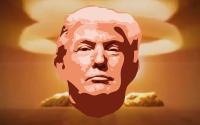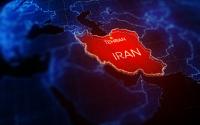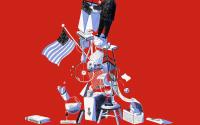Landing on Jihadi Beach
7 June 2004Tom Engelhardt Znet
Last weekend, while dedicating the National World War II Memorial on the Washington Mall in front of thousands of veterans of that war, including his own father (who had bailed out of a torpedo bomber south of Japan in 1944), the President choked up while saying: "These were the modest sons of a peaceful country, and millions of us are very proud to call them Dad. They gave the best years of their lives to the greatest mission their country ever accepted." He then held center stage with his father, that ultimate baby-boomer Bill Clinton, and a war that has gained such a glow of nostalgia and good feeling in recent years that it now had its iconic book (The Greatest Generation), its iconic movie (Saving Private Ryan), its iconic TV mini-series (Band of Brothers), and was now a launching platform for "a 100 day series of events, 'America Celebrates the Greatest Generation.'"
Our President had to feel some relief, wrapping himself in his father's 48-star flag. Here, finally, was a glorious war experience that a bunch of ragtag insurgents, terrorists, Baathist dead-enders, and general riffraff couldn't take away from us. Here was a war that matched his rhetoric of recent years -- one where you could actually talk about the "march of freedom" and "ultimate victory." Here was a war that sidelined his opponent in November, who had actually gone to war and was now, as the Washington Post put it (Mike Allem, 5/30/04), "just a face in the crowd, off in the congressional section and invisible to those onstage."
Our President was, you might say, in his element speaking of the war his father took part in as a "gallant time in the life of our country." More than that, he had -- like Star Trek's the USS Enterprise entering a worm hole or the time traveler in H. G. Wells' famous tale strapping himself into his machine -- started out in the mundane present where things seemed to be going from bad to worse and ended up (or so his advisors hoped) someplace far, far away where he hoped to remain through at least the rest of a month while visiting Rome, Paris, Normandy, and Sea Island, Georgia (for the G-8 summit) as well as his normal quota of military establishments.
This very week made it more than clear that the present was certainly no place to tarry. After all, in his own war on terror, he had had to admit to stunned reporters that he had just consulted a lawyer in the case of the outed CIA agent Valerie Plame; his vice president had just been questioned in the same case; the Abu Ghraib scandal like the war in Iraq refused to leave the headlines; a new "transition administration," headed by a former CIA asset, huddled in Baghdad's Green Zone as America's dead climbed inexorably above 800, heading for the horrifying 1,000 mark by mid-summer; the Pentagon announced that, via a "stop-loss" directive, it was involuntarily extending the tours of duty of many of its "volunteers," causing a rumble of protest; and in Washington the President's beleaguered CIA director George Tenet and his deputy director of operations James Pavitt of the Agency's "clandestine service" (read: "dirty tricks") either jumped ship or were shoved overboard in stormy seas. (My hometown paper, 6/4/04, quoting an unnamed agency official on its front-page, insisted that Pavitt's leave-taking announcement, within a day of his boss's, "had been planned for some time and had nothing to do with Mr. Tenet's resignation.") Whatever the explanation, the two suddenly found themselves out in the cold, evidence of a delaminating administration.
In the meantime, the vice president's and Pentagon's favorite Iraqi, Ahmed Chalabi, seemed headed down the tubes as an "Iranian spy," along possibly with some of his favorite neocons; while in the wings waited other investigations, reports, leakers, angry military men, even conservative funders (New York Times, 6/4/04), threatening to sit on their hands during the upcoming campaign, while poll figures continued to slip, and where, oh where, was the cavalry? Well, it seems they were there, in wheelchairs, at the World War II Memorial and in uniform later in the week at the Air Force Academy, where George gave the second of his major addresses about Iraq, speaking of "the great challenge of our time, the storm in which we fly," and again at the American cemetery in Normandy where on the 60th anniversary of D-Day, President Chirac spoke of America as France's "steadfast friend and ally" (Washington Post, 6/6/04).
Up on stage at the National World War II Memorial, the boy who had fought an Oedipal struggle with his father's presidency for three years teared up on stage while invoking the Good War and the Greatest Generation, while, in fact, practically pleading with his father's war to ride to his rescue. There was certainly irony in this, but it went largely unnoticed, even when, later in the week at the Air Force Academy in a grim graduation speech, the President attempted to merge his war and his dad's. ("In other ways [the war on terror] resembles the great clashes of the last century between those who put their trust in tyrants and those who put their trust in liberty.") In that strange speech, he conflated the embattled first days of World War II ("Like the Second World War, our present conflict began with a ruthless surprise attack on the United States..."), the embattled early years of the Cold War ("More than two years after the Nazi surrender, there was still starvation in Germany. Reconstruction seemed to be faltering, and the Marshall Plan had not yet begun."), and his own embattled war in Iraq into a pottage of historical mis-analogy. He and his speechwriters were, it seemed, ready to reach for any moment in our history when "the outcome was far from certain" as long as that outcome was "ultimate victory."
His language would have been familiar to anyone growing up watching the newsreels (with those stentorian male over-voices) of the early Cold War era. To the graduating cadets, the President spoke of "the forward march of freedom," of the dangers of appeasers, of the "ideology of terrorism," of the "free world" and the "camp of free nations," of "setbacks on the course to victory," of keeping faith with "captive peoples," and so on. In this odd stew of retro-history, laced with the lost language of the Cold War, Al Qaeda, the Taliban, Saddam's Iraq and small freelance terror groups across the globe took the place of the great dark empires of Japan, Germany, and the Soviet Union, even as post-Saddam Iraq morphed into post-war Germany and post-war Japan combined, assumedly leaving al-Qaeda and al-Qaeda like groups alone to fill the giant, empty shoes of the late Ronald Reagan's Evil Empire. Somehow, then, we find ourselves -- if the President is to be believed -- in the early embattled moments of a titanic global struggle, a combo World War II/Cold War, close to a planetary Armageddon, with no end in sight. If Iraq is indeed Vietnam on crack cocaine, then the President's vision is his father's history on LSD.
And yet, in his strange review of our warring past and his preview of World War III, something was missing. Two days before the World War II Memorial was dedicated, with TV preparing a week-long D-Day onslaught, Senator John Kerry took quite a different walk down what was anything but Memory Lane. He took what, this week, had to look like a byway of history, visiting the memorial to his war, the Vietnam Wall. While George readied himself for speeches,dedications, radio addresses, Memorial Day proclamations and the like, all of which would be dedicated to associating the war on terror with his father's hot and cold wars, Kerry "walked somberly along the shiny black granite wall" saying little -- only two words of significance actually, as he gazed at a photo of William Bronson, who died in 1976 of a head wound received in Vietnam and whose name the senator had worked to have added to the Wall. "So young," was all he said. Two words that caught everything.
Two wars; two presidential candidates; two visits. Which represents the future, which the past? Two memorials, one to the President's father's war, the other to the contender's war -- a wall which, at this moment, would be hard for George Bush to visit. It would bring all the wrong images to mind. It would raise, once again, memories of those months of "service" in the Texas Air National Guard that disappeared down some memory hole and, of course, of that lost counterinsurgency war about which victory was so often anticipated, progress so often proclaimed, light so often seen over so many years before helicopters were tipped over the sides of aircraft carriers and we left the scene with our dead and wounded. That war, that analogy -- the only one with some relevance to the present moment -- is now, of course, being shoved into the closet.
And yet, as the present ceremonies fade, minds will once again turn Vietnam-wards, for Americans know in their hearts that the war in Iraq isn't Normandy, or the occupation of Japan, or the Berlin Blockade, or the Cuban Missile Crisis. Iraq is a faltering counterinsurgency war meant to sustain what increasingly looks like a failed state in a spectacularly failed region. (Hirst, Guardian, 6/4/04)
If an analogy to the present moment is needed, it's John Kerry's war that comes to American minds every time. During his war, two presidents -- Lyndon Johnson and Richard Nixon -- desperately tried to keep the look of victory in place amid all the signs of impending defeat; always there were new "initiatives"; always the comparisons to World War II, always the raising of the ghost of appeasement (linked in those days, when people would have recognized the reference, to Munich); and always, despite every presidential effort, there was slaughter without victory, war without end. "We have," bemoaned President Johnson at one point, "no songs, no parades, no bond drives and we can't win the war otherwise." Both presidents, like our present one, took to giving their speeches meant to rally the public (and give a bump to their poll numbers) before captive military audiences.
In the Nixon era, as Watergate began to unravel, only two potential allies of consequence remained for the embattled president -- the Russians with whom, unlike the Democrats, one might achieve "détente," and Communist China. As his popularity began to unravel at home, Nixon engaged in ever more diplomatic pageantry with Brezhnev's Russia and Mao's China, in effect throwing himself on the mercy of his former enemies to shore up his poll ratings at home. He acted increasingly "presidential" on a world stage as events closed in on him in Washington. This weekend President Bush, the younger, went to France and threw himself into the arms of Jacques Chirac, pleading eternal friendship, as he had recently been pleading with the previously despised UN to give his Iraq policies its fig-leaf of support, as last week he snuggled into the comforting embrace of his father's war -- all, as his advisors said, in the attempt to "launch a turnaround in his battered public image" (Allen, Washington Post, 5/30/04). The President, then, was engaged in his own titanic struggle for – to use a word adored in Washington in the Vietnam era as today – "credibility."
In much of this, I think I understand something of our President, for we share a few background details in common. For one thing, we both had fathers in World War II. Last weekend, glimpsing the aged faces of the vets at the Memorial dedication on TV, I couldn't help missing my own dad, dead these twenty years. Only one passage in Bush's address, however, struck a chord in me and it was played for laughs, though it was deadly serious.
"The ranks were filled with men like Army Private Joe Sakato," the President said. "In heavy fighting in France, he saw a good friend killed, and charged up a hill determined to shoot the ones who did it. Private Sakato ran straight into enemy fire, killing 12, wounding two, capturing four, and inspiring his whole unit to take the hill and destroy the enemy. (Applause.) Looking back on it 55 years later, Joe Sakato said, 'I'm not a hero. Nowadays they call what I did "road rage."' (Laughter.)
This was oddly familiar to me. Every now and then in those postwar years, my father would indeed break into what could only be called "road rage," aimed invariably at something Japanese or German. My father was a 35-year-old Jew who, right after Pearl Harbor, volunteered to fight the Nazis and ended up as operations officer for the 1st Air Commando Group in Burma. I was myself born on July 20, 1944, the day of the failed officer's assassination plot against Hitler.
Like so many of those guys who never questioned the need to go, my father returned from the war against fascism very silent. (Of course, it didn't help that, while he was away, his small business had collapsed.) Undoubtedly he brooded about his war, which, while unbearably necessary, was certainly the single worst war in history, turning vast swaths of the planet into a charnel house, and ushering in several varieties of industrialized mass slaughter and genocide. Its last days, of course, introduced us to atomic weapons and a new age in which we stood at least reasonable odds of exterminating ourselves, as we still do.
This is why when Studs Terkel entitled his stirring 1984 oral history of that horrific war, "The Good War," he put the phrase, picked up from vets he knew, in quotes on the cover. ("Quotation marks have been added," he wrote in a note, "not as a matter of caprice or editorial comment, but simply because the adjective 'good' mated to the noun 'war' is so incongruous.") And it tells us much about the way we baby-boomers have romanticized the Good Warriors and their war that the phrase stayed around, but sometime in the later 1990s, the quotes disappeared.
Though I can't know whether, like my father, George's dad was largely silent about his war experience, I do know that the silent dads of the post-war era were remarkably commonplace. Fortunately, or unfortunately, for us kids, our fathers didn't need to say much, since the culture stood in so volubly for them. My father, in all the years I knew him, told only a couple of modest tales from his wartime experiences, but as a boy I never doubted the nature of the heroic deeds he accomplished in winning the war. I had seen it all, thanks to John Wayne and heroes of the screen. Like George (and most of the rest of his crew), I had spent enough hours in movie theaters thrilling to war movies, or watching Victory at Sea on TV, or playing out my father's war in the park with sticks, or with toy soldiers on my floor, to have made a version of that war my own – and I recognize it still in the President's words, formal and informal.
Those Marines advancing through Japanese or German lines to ultimate victory took up screen space that might otherwise have been occupied by America's first Asian defeats -- the coming to power of a communist regime in China, a stalemated disaster of a war in Korea, and an American-backed war going ever more poorly for our French ally in what was then called Indochina, not to speak of a raging undercurrent of fear about a nuclear cataclysm. (You could, by the mid-1950s, watch those nuclear fears erupt on screen, though transmuted onto alien planets or into the forms of irradiated monsters of every sort ready to visit your local drive-in and flatten it.)
Our fathers' on-screen war, however, was war sunnyside up and it was for many of us a deeply affecting experience. To this day, nothing can stop the chills from running up my spine when I catch one of those old films and our soldiers finally move victoriously forward; but Vietnam at least put constraints on that for me. You could say it sobered me up about the fantasy of war and made me realize that one of the great glories of my childhood, that scene where the Indians/Chinese/Japanese fell by their scores was not just a spectacle, but a spectacle of slaughter.
For the president and his men, who, with the sole exception of Colin Powell, avoided any aspect of the Vietnam experience, those scenes of paternal movie glory remain, I suspect, untarnished. Fresh and sunny, they still embody -- so I've long argued -- the essence of what war was meant to be.
When the President called on the cadets at the Air Force Academy to step forward as the next (greatest) generation, he undoubtedly meant it, even if he didn't write the lines. ("As your generation assumes its own duties during a global conflict that will define your careers, you will be called upon to take brave action and serve with honor... Our goal -- the goal of this generation is the same. We will secure our nation and defend the peace through the forward march of freedom.") My father, a no-nonsense kind of guy who didn't much like regular army officers and was happy to tell you so, wouldn't in the vigor of his life have recognized himself as one of "the greatest generation." The thought, had the term then existed, would have made him laugh –- and not because he didn't value his comrades-in-arms either. He never questioned the need to go to war, given fascism and Nazism, but he never forgot the brutality of his war either. For him, it was, to take one of our President's recent adjectives, the least "gallant" of wars.
While our President often says we are reluctant as a nation to go to war ("Through our history, America has gone to war reluctantly because we have known the costs of war..."), his visible lack of hesitancy about war, his lack of seriousness about it, has long been apparent. From the fooling around, caught on camera, just before he declared war on Iraq, to that landing in full, color-coded paraphernalia on the USS Abraham Lincoln ("Mission accomplished!") to that "bring 'em on," when the insurgency in Iraq began to get traction, you can feel a man still in the movie theaters of his childhood, still involved in warplay: Bravery! Gallantry! Guts! Honor! And then the bugle blows, the charge begins, and the Americans move forward to save the world.
For him, I suspect, the war on terror was thrillingly real (and yet utterly ersatz) from the moment he declared it. Until things began to go wrong, it must have felt like living out a fantasy. Even now, he clearly enjoys the feel of the large phrases -- "History is once again witnessing a great clash," "so we will not retreat," "our will is strong." And all of it -- presented to us in the name of advancing "freedom" and in an overblown language which vets like my father would once have found utterly false -– leads him into a world in which the urge to go to war is enshrined as a prime directive, in which war is the first option (from which countless Abu Ghraibs can only follow):
As he told the cadets: "With all the skill of our law enforcement, all the stealth of our special forces and all the global reach of our air power we will strike the terrorists before they can strike our people. The best way to protect America is to stay on the offensive... And America's made a decision about these terrorists: Instead of waiting for them to strike again in our midst, we will take the fight to the enemy."
Unfortunately for our President, at the end of his tunnel, is not the beachhead at Normandy, but a failed war in the Middle East, a war that will always lack a landing on Jihadi Beach.
[For those curious to know more about a Cold War childhood, war sunnyside up and the strange triumphalist culture that lay behind it, how it collapsed during the Vietnam War, and the various attempts to rebuild it since, consider checking out my book The End of Victory Culture.]
[This article first appeared on Tomdispatch.com, a weblog of the Nation Institute, which offers a steady flow of alternate sources, news, and opinion from Tom Engelhardt, long time editor in publishing and author of The Last Days of Publishing.]






